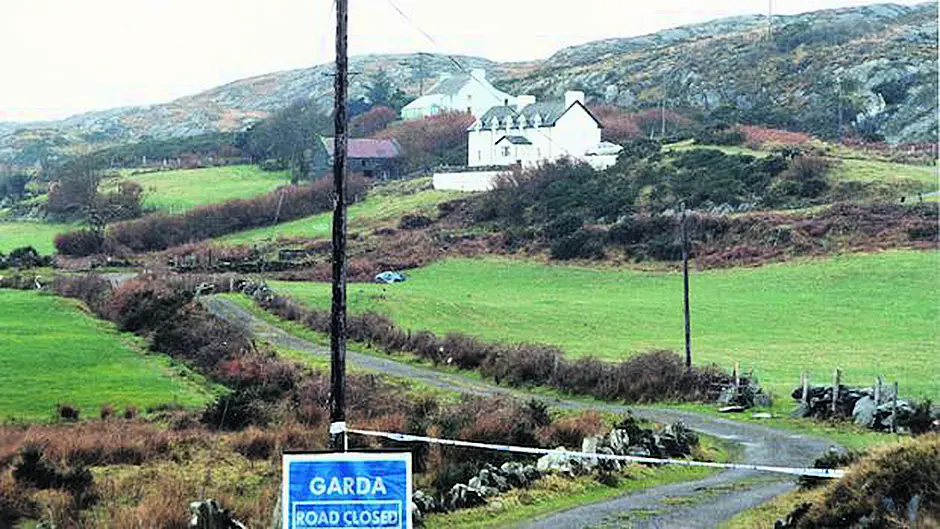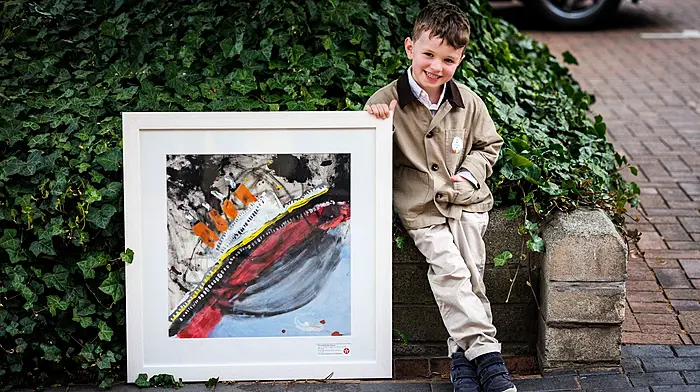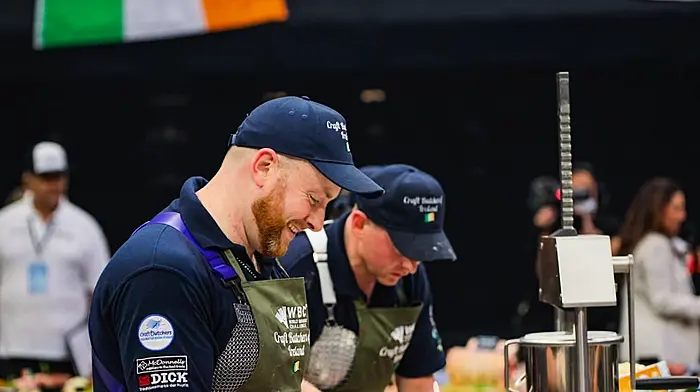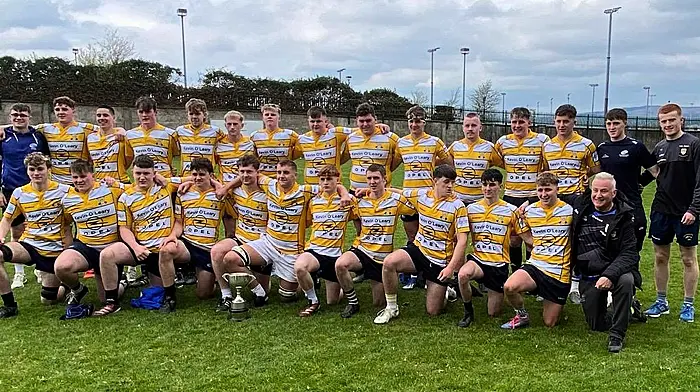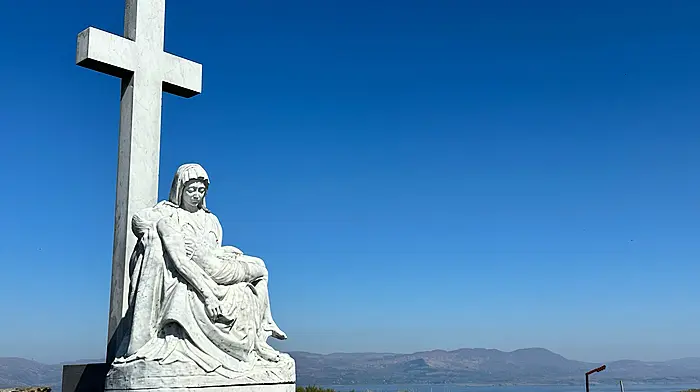On the 25th anniversary of one of Ireland’s most notorious and vicious murders, Jackie Keogh, who reported on the death of Sophie Toscan du Plantier, recalls the tragically unsolved mystery
THE death of Sophie Toscan du Plantier still haunts West Cork.
The French film producer was brutally murdered on the night of December 23rd 1996, and no one has ever been charged with her murder.
The horrific details of the case – her callous slaying by blunt force trauma to the head – and the bizarre legal ramifications of the case, has turned the murder of a beautiful, intelligent 39-year-old woman into a grim murder mystery, or worse, a macabre tourism ‘attraction.’
On Thursday December 23rd Sophie’s son Pierre Louis Baudey-Vignaud, and the remainder of her still-grieving family, will hold a private memorial service in Paris to honour with dignity the mother, daughter and niece they loved.
Locally, a group of friends placed a memorial notice in The Southern Star to show solidarity with the family and the organisation – the Association for the Truth of the Murder of Sophie Toscan de Plantier – that was formed by her uncle Jean Pierre Gazeau in 2007.
Sophie, whose family name is Bouniol, bought what she believed would be a private, peaceful cottage in Toormore outside Schull in 1993.
It was her sanctuary, a place where she could restore herself before facing back into a busy and demanding career in the film industry, alongside her film producer husband Daniel Toscan du Plantier.
She had three seemingly blissful years visiting Schull but on the night of December 23rd 1996, Sophie was so badly beaten that her parents were traumatised by what they saw.
Her lifeless body, clad only in her night clothes, was found at the end of the earthen lane leading to her home – a place that today is marked by a stone Celtic cross.
The news, at Christmas time, horrified not just West Cork – all of France looked on in dread astonishment and anguish.
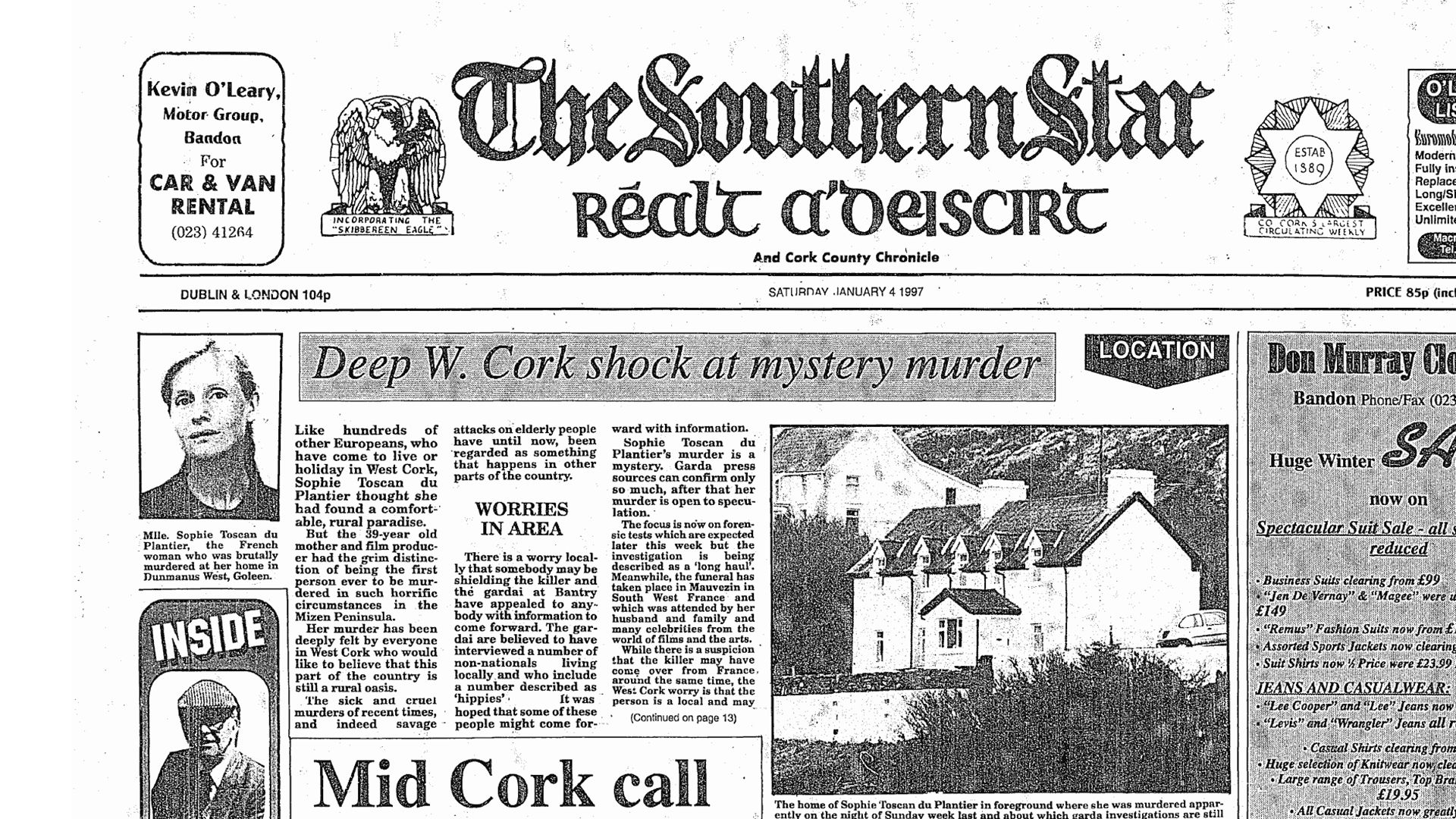 A headline from The Southern Star days later.
A headline from The Southern Star days later.
Gardaí, under Supt JP Twomey of Bantry Garda Station, began a murder inquiry and on January 11th 1997 they got a phone call, a lead from a local woman Marie Farrell.
She said she a saw a man by Kealfadda Bridge around 3am on the night Sophie was murdered, and, on February 4th, a schoolboy told gardaí that Ian Bailey of The Prairie in Schull admitted killing Sophie Toscan du Plantier. He was alleged to have said he ‘went up there with a rock and bashed her f**king brains out.’
Ian Bailey has – in every conceivable way – denied this allegation. Not only has he denied the murder charge, he has accused the police system in Ireland, and the French judiciary, of trying to fit him for the murder.
On February 10th of that year, Ian Bailey was arrested for the murder and taken to Bandon Garda Station for questioning. He was released without charge, but the word quickly got out that Ian Bailey was the main suspect in the case.
Rules around who can and cannot be named publicly as a suspect went out the window, especially after Ian Bailey came forward to tell reporters – of which he was one – that he was a suspect and that he had nothing to do with it.
From that moment on, there seemed to be no-holds-barred in this case and the volumes that have been written were followed this year by, not one, but two TV series – Sophie: A Murder in West Cork on Netflix and Jim Sheridan’s Murder at the Cottage which aired on Sky – claiming to have new insights and be seeking justice for Sophie.
 The picture of Sophie used in her West Cork friends’ memorial.
The picture of Sophie used in her West Cork friends’ memorial.
It was on April 17th that the State Pathologist Dr John Harbison reported how Sophie Toscan du Plantier died from multiple injuries, including laceration of the brain and a fracture of the skull, caused by a blunt instrument. The actual wording of his report is too gruesome to commit to print.
A 2,000-page file on the murder was sent to the DPP in September 1997, but law officers within the DPP’s office were highly critical of aspects of the garda investigation. An inquiry was held and, in July 2008, the DPP concluded the evidence did not warrant a prosecution.
In January 1998, Ian Bailey was arrested for the second time and was again released without charge. And, in August 2001 he was prosecuted for assaulting his partner Jules Thomas at their home and given a three-month suspended sentence.
Meanwhile, on December 19th 2002, Sophie’s parents Georges and Marguerite Bouniol and her son, Pierre Louis, who were distressed by the way the case was proceeding in Ireland, commenced a civil action against Ian Bailey for her wrongful death.
The following December, Ian Bailey commenced a libel action against eight newspapers for linking him to the murder. He lost six of these cases, but won two.
Ian Bailey also threatened Marie Farrell with legal action if she did not retract comments she made about him in the media following the conclusion of the libel action and she sent a solicitor’s letter refusing to retract her comments.
However, in 2005, Marie Farrell did retract her evidence, claiming she was coerced by gardaí into making a false statement incriminating Ian Bailey.
Ian Bailey lodged High Court papers in 2007 suing the Minister for Justice and the Garda Commissioner for wrongful arrest, harassment and breach of his constitutional rights, but he lost the case in 2015 and was ordered to pay all of the legal costs.
It was in 2008 that the DPP recommended there be no prosecution, but the Garda Commissioner did make the case file available to French authorities.
As part of their own lengthy investigation, a team from France travelled to Ireland to inspect the murder scene, and to meet with gardaí investigating the murder.
In 2010, a European arrest warrant was issued for Ian Bailey, but this was successfully contested – on no fewer than three occasions – by Ian Bailey and his solicitor Frank Buttimer.
In the midst of all this, Ian Bailey graduated with an honours degree in law and a masters in 2010 after writing a thesis entitled, Policing the Police – Garda Accountability in Ireland.
Although absent from the proceedings, Ian Bailey was tried in a French court in May 2019 and found guilty of the murder of Sophie Toscan du Plantier and sentenced to 25 years in jail.
Trials in absentia are not recognised under Irish law and the Supreme Court ruled that Ian Bailey could not be extradited.
The case and Ian Bailey has featured in many newspaper reports since then.
Indeed, many column inches were devoted to his separation from his longtime partner Jules Thomas in April of this year.
But it was the release of the two TV series that proved explosive. It led to many tourists travelling to West Cork to engage in the ghoulish practice of driving to her home at Toormore.
There was an outcry about this by those who believe it was a final indignity, given that her bloodied remains had lain on the ground for more than 24 hours before the State pathologist arrived to carry out a preliminary examination.
On this, her 25th anniversary, her family and friends wish to remember her as she was in life, and continue their campaign for justice.

